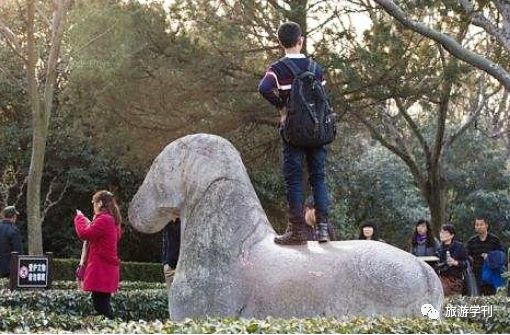佳文速递 |
您所在的位置:网站首页 › 欢迎到此一游的句子 › 佳文速递 |
佳文速递
|
1 研究缘起 生活中,有关游客不文明行为的报道频繁出现,“到此一游”几乎成为游客不文明行为的代名词。每到“十一”黄金周、春节期间,全国各地不文明行为频发,管理部门出台的政策似乎效果不佳。我们对这个反复出现且呈愈演愈烈之势的社会热点问题产生了浓厚兴趣,希望从一个与以往学者不同的角度进行研究,丰富理论体系,对社会做出一些贡献。
图片来源:百度图片 由于我们之前的研究多集中于消费者行为领域,对心理学理论有一定的涉猎,于是考虑是否可以从心理学的角度,从深层次分析游客不文明行为的原因呢?在大量阅读中英文文献的过程中,我们发现道德认同这一构念可以用来解释游客不文明行为的原因,且尚未在旅游学领域得到广泛关注,因此从道德认同角度切入,探索游客处于氛围宽松的旅游场景时,道德认同是否依然能提升游客的道德行为意愿。但是游客的公共自我意识有差异,公共自我意识可能对道德认同与游客的道德行为的关系产生影响,考虑将其作为调节变量。自我问责指人们想要依照自我标准行事的欲望,通常作为中介来研究,也比较适合本课题。
图片来源:百度图片 2 研究体会 在因变量的名称选择上,我们费了一番功夫。国内外学者相近的研究变量有“环境负责任行为”“负责任旅游”“旅游者生态文明行为”“亲环境行为”等,但其含义均侧重于旅游地自然环境和资源。而我们想研究的实际上是游客不文明行为,不仅仅指其对旅游地自然环境的破坏,还包含对旅游地人文景观的破坏或其他在公共场合有损他人利益的不适当行为。国外学者对游客不文明行为研究极少,类似的研究是针对更严重的游客不当行为,如酗酒、吸毒,与我们的研究重心不同,因此我们把目光转向中文定量文献。经过大量阅读和推敲,最终选用“游客道德行为意愿”(张翠娟,白凯,2015)来反向测量游客不文明行为意愿。 在进行逻辑推演之后,我们建立了有调节的中介模型。不同于大部分学者采用的调查法,我们采用更能够有效控制变量的实验法进行研究,使用问卷形式,主要分为一个预实验和一个主实验。预实验的目的是验证主效应和改良游客道德行为意愿量表。在发现主效应得到验证,但量表信度较低之后,我们咨询专家进行了修改。主实验有459人参与,问卷的随机分配使混淆变量得到控制。主实验分为五个部分,首先是个人资料调查。然后是对道德认同的操纵,分为启动和不启动道德认同两组。接下来是公共自我意识的测量,共有7个题项,例如“我很关心我做事的风格”“我很在乎如何向他人展示自己”。第四部分是对游客道德行为意向的测量,根据预实验之后的调整,最终采用9个题项,其中包含反向计分题目,以甄别被试是否认真作答。最后是对自我问责程度的测量。收集问卷之后,我们用SPSS进行了数据处理,并采用bootstrapping技术对中介效应进行检验,发现假设均得到验证。 3 投稿心得 本文于2017年11月3日投稿,经历了一轮外审修改,于2018年4月30日被接收为备用稿。外审阶段,两位外审专家为本文提出了非常宝贵的审稿意见,使本文的质量在修改之后有较大的提升。稿件责编阶段,吴巧红主编与我们进行的邮件往来有5次之多,对文章的每一处细节问题进行探讨。学刊编辑老师的认真负责、细致耐心实在令我们敬佩! 投稿的过程是折磨的,修改文章往往比写一篇文章还要困难,我们根据专家的意见不断打磨文章,力求使表述更清晰准确、简洁规范;不断根据学刊的要求修改参考文献格式、图表格式,并对英文摘要进行润色,不放过每一处细节。当得知稿件被接收和最终发表的时候,我们喜悦的心情溢于言表!有了来自学刊的鼓励,我们会努力把未来的研究做得更好。 Highlights 1.将心理学中较为成熟的道德认同理论引入旅游学科,并对旅游情境下道德认同能否产生与其他情境相同的作用进行考察,得到肯定的结论。 2.将自我问责概念引入游客道德行为研究,揭示了深层的中介机制,改进了以往游客道德行为研究的薄弱环节。 3.从游客的个人特质角度进行研究,发现游客的公共自我意识可以有效地调节游客道德行为,丰富了游客消费行为研究。 摘要和关键词 摘要:在旅游景区,诸如“某某到此一游”式的不文明涂鸦行为屡禁不止,成为旅游行业一个久治不愈的顽疾。本文从道德认同的视角对该问题进行深入的理论研究,运用实验方法探究道德认同与游客道德行为意向之间的关系。研究发现:(1)启动游客的道德认同能显著提高游客道德行为意向;(2)游客的公共自我意识调节道德认同与道德行为意向之间的关系;(3)自我问责对道德认同和游客道德行为意向的关系起部分中介作用,并且受到公共自我意识的调节。该研究将道德认同和自我问责引入旅游研究领域,拓展了游客消费行为研究的深度和广度。从实践上,将道德认同运用于约束游客不文明行为,对游客行为进行积极的引导有一定的借鉴意义。 [关键词]游客不文明行为;道德认同;自我问责;公共自我意识;道德行为意向 Abstract At tourist attractions, graffiti behavior, such as writing “I was here” or a person’s name on cultural relics, is usually prohibited; however, it is still a frequent phenomenon. As well as writing on cultural relics, inappropriate tourist behavior includes such acts as littering, spitting, climbing on relics, walking on lawns, and stealing exhibits. Worldwide, both Chinese and foreign tourists have been found to engage in such inappropriate behavior in scenic areas. Most domestic scholars attribute this type of behavior to such factors as spiritual civilization having fallen behind material civilization, the formalization of quality education, and poor ecological consciousness on the part of tourists. In response, scholars have suggested various management strategies, such as promulgating relevant laws by governments and greater tourist guidance by administrative departments. Various administrative measures have been undertaken, but the results have always been negative. One of the main reasons is that inappropriate behavior derives from the moral awareness of tourists; thus, much deeper solutions are required. Moral identity is a mature concept in the field of moral cognition: it refers to a set of moral characteristics of self-schemas. It has been confirmed that moral identity can serve a supervisory role for individual behavior in some contexts. Moral identity contains both the character perspective and the social-cognitive perspective; but the two perspectives are basically the same. The social-cognitive perspective maintains that a changing situation can produce different levels of moral identity. Accordingly, the present research adopts the social-cognitive perspective. To examine the mediation of inappropriate tourist behavior, this paper introduces the concept of self-accountability, which relates to the desire to practice one’s self-standards. Further, the concept of public self-consciousness is introduced to determine the moderating effect with this model. Inappropriate behavior is a sensitive issue: respondents often conceal their true opinions in surveys or experiments. Thus, in the present study, inappropriate behavior was assessed in terms of moral behavior intentions: the higher an individual’s moral behavior intention, the lower is their intention to conduct inappropriate behavior. First, a pretest was conducted and the study’s main effect was confirmed. However, the reliability of the moral behavior intention scale was found to be rather low. Accordingly, the scale was adjusted. In the subsequent main experiment, 510 subjects were randomly selected following online and offline recruiting; they were randomly assigned to an activating moral identity group or non-activating moral identity group. After eliminating incomplete or non-valid responses, 459 questionnaires were used for analysis: 135 from online and 324 from offline respondents. The data were analyzed using SPSS, version 22 software. The concept reliability and validity were empirically tested, and it was found that the experimental data were valid for analysis. The following results were obtained. (1) Activating tourists’ moral identity can significantly improve their moral behavior intention. (2) The relationship between moral identity and tourists’ moral behavior intention was moderated by their public self-consciousness. (3) Self-accountability partially mediates the effect of moral identity on moral behavior intention; among tourists whose public self-consciousness was at a higher level than that of others, the mediating effect of self-accountability was weaker. This study introduces the concepts of moral identity and self-accountability to tourism academia, and it extends the depth and breadth of tourist consumption behavior research. The results have practical benefits in activating moral identity toward reducing inappropriate behavior by tourists; that outcome will be favorable for managing tourist behavior by relevant administrative departments. [Key words]inappropriate tourist behavior; moral identity; self-accountability; public self-consciousness; moral behavior intention 【编后语】 文明旅游建设是新时代优质旅游建设的应有之义。旅游者环境责任行为、旅游者文明旅游行为、旅游者道德行为等相关研究在国内旅游学术界仍处于起步阶段,研究空间巨大。实验法在心理学、市场营销学等学科已得到广泛的应用与验证,但在旅游学术研究领域仍较为缺乏。该篇佳文的成功发表给我们很好地展示了实验法在文明旅游研究领域的潜在价值。在今后的研究中可以考虑更多地应用实验法对上述相关细分议题开展深入探讨,从而有效完善文明旅游研究的方法体系,不断推进文明旅游研究迈向新的台阶。 引用本文 吴思, 郭丹丹. “到此一游”现象为何屡禁不止?——基于道德认同的视角[J]. 旅游学刊, 2018, 33(11): 26-36. 照片来源 || 封面及正文图片:百度图片 本期微信编辑 || 邱宏亮(浙江旅游职业学院工商管理系 副教授、博士) 张苗荧(浙江旅游职业学院工商管理系 教授、中国旅游报特约评论员) 杨智健(浙江旅游职业学院工商管理系 市场营销专业学生) 欢迎转载,转载请联系《旅游学刊》编辑部授权返回搜狐,查看更多 |
【本文地址】

